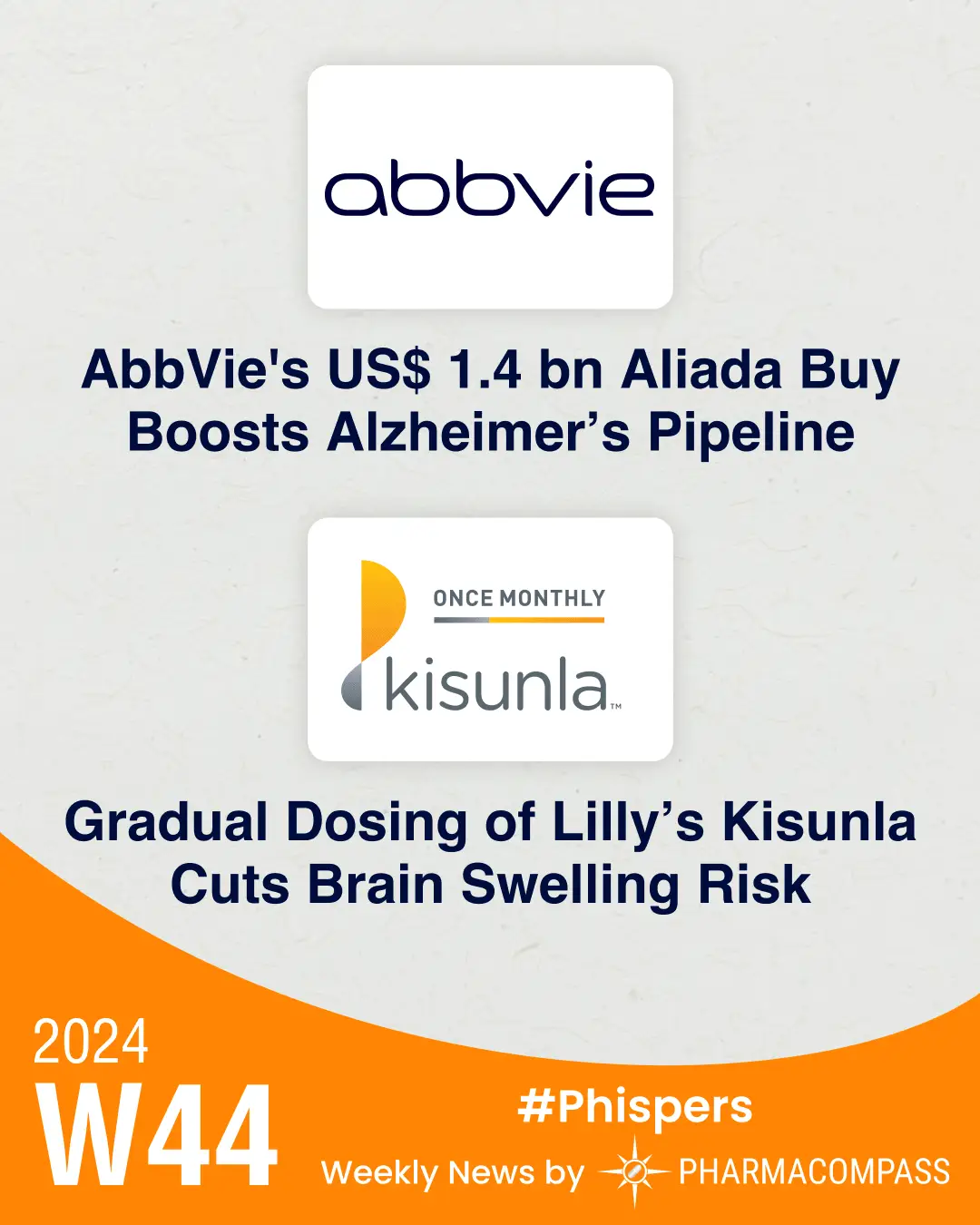
By PharmaCompass
2024-10-31
Impressions: 837 (Article) || 16 (Video)
This week’s Phispers is packed with latest developments in the field of Alzheimer’s disease, owing to a conference being held in Madrid (Spain). First, AbbVie announced it is acquiring Boston-based Aliada Therapeutics for US$ 1.4 billion in order to bolster its Alzheimer’s pipeline. Second, Lilly announced that gradual dosing of its Alzheimer’s drug Kisunla (donanemab) cuts risk of brain swelling by 41 percent. Third, research published in a journal revealed that type 2 diabetes patients who were on semaglutide (Ozempic and Wegovy) had significantly lower risk of developing Alzheimer’s. And four, in a phase 2 trial, Coya Therapeutics’ experimental antibody drug was found to be safe and increased levels of a type of immune cells that help prevent neuro-inflammation in Alzheimer’s disease.
The week also saw two deals in the field of molecular glue degraders, a novel therapeutic approach — Novartis signed a potential US$ 2.2 billion deal with Monte Rosa; and Biogen inked a potential US$ 1.45 billion deal with Neomorph.
Meanwhile, Roche expanded its collaboration with Dyno Therapeutics, committing over US$ 1 billion to advance the development of next-generation adeno-associated virus (AAV) gene therapy vectors.
In approvals, Iterum Therapeutics has received the US Food and Drug Administration’s approval for its new oral antibiotic designed to treat uncomplicated urinary tract infections (uUTIs) in adult women. The agency also granted accelerated approval to Novartis’ Scemblix (asciminib) to treat adult patients with newly diagnosed Philadelphia chromosome-positive chronic myeloid leukemia in chronic phase (Ph+ CML-CP).
AbbVie strengthens Alzheimer’s pipeline with US$ 1.4 bn acquisition of Aliada
AbbVie is acquiring Boston-based Aliada Therapeutics for US$ 1.4 billion in a move aimed at bolstering its focus on Alzheimer’s disease and enhancing its neuroscience pipeline. AbbVie reportedly outbid at least three other pharmaceutical companies.
Aliada adopts an innovative approach to crossing the blood-brain barrier, a critical challenge in treating central nervous system diseases. The acquisition includes Aliada’s lead compound, ALIA-1758, which is currently in phase 1 clinical trials. This compound has the potential to be a best-in-class therapy for Alzheimer’s disease.
Gradual dosing of Lilly’s Kisunla cuts risk of brain swelling by 41%: Eli Lilly has announced promising results from a study on its Alzheimer’s drug, Kisunla (donanemab), showing that a modified dosing regimen significantly reduces the risk of brain swelling, a side effect associated with such therapies. The study found that adjusting the initial doses of Kisunla led to a 41 percent reduction in the incidence of amyloid-related imaging abnormalities with edema (ARIA-E) compared to the standard dosing regimen. The study also highlighted that the modified dosing regimen did not compromise the drug’s efficacy in reducing amyloid plaques.
Novo’s Ozempic, Wegovy linked to lower Alzheimer’s risk: Research published in the journal Alzheimer’s & Dementia found that individuals with type 2 diabetes who were treated with semaglutide (Ozempic and Wegovy) had a significantly lower risk of developing Alzheimer’s compared to those using other diabetes medications. Semaglutide’s neuroprotective effects are believed to stem from its ability to reduce inflammation and oxidative stress, which are common factors in both diabetes and Alzheimer’s.
Coya’s Alzheimer’s med posts positive immune response in mid-stage trial: Coya Therapeutics’ experimental antibody drug Coya 301 was found to be safe in treating Alzheimer’s disease in a small, phase 2 trial. The drug also increased levels of a type of immune cells that help prevent neuro-inflammation. Coya is a clinical-stage biotechnology company developing biologics intended to enhance regulatory T cell (Treg) function.
Novartis inks up to US$ 2.2 bn deal with Monte Rosa for molecular glue degraders
Novartis has committed US$ 150 million upfront to Monte Rosa Therapeutics in a potential US$ 2.2 billion deal to develop a new class of drugs known as molecular glue degraders. These degraders represent a novel therapeutic approach by facilitating the degradation of disease-causing proteins that are otherwise difficult to target with conventional drugs.
Biogen, Neomorph ink potential US$ 1.45 bn deal: Biogen is committing up to US$ 1.45 billion to Neomorph to develop molecular glue degraders. This partnership aims to discover and develop these innovative small molecules for treating Alzheimer’s, rare neurological, and immunological diseases.
In mid-October, Pfizer had signed a similar deal with Massachusetts-based Triana Biomedicine, making this the third deal in the field of molecular glue degraders of the month.
Roche expands gene therapy pact with Dyno, promises additional US$ 1 bn
Roche has expanded its collaboration with Dyno Therapeutics, committing over US$ 1 billion to advance the development of next-generation adeno-associated virus (AAV) gene therapy vectors. This new agreement builds on their initial partnership established in 2020, which focused on developing AAV vectors for neurological and liver-directed therapies. Under the terms of the new deal, Roche will pay Dyno US$ 50 million upfront, and this expanded partnership is expected to accelerate the development of innovative gene therapies, providing new treatment options for patients with life-altering neurological diseases.
Iterum lands maiden FDA nod for antibiotic to treat urinary infection
Iterum Therapeutics has received FDA approval for its new oral antibiotic, Orlynvah (sulopenem etzadroxil and probenecid), designed to treat uncomplicated urinary tract infections (uUTIs) in adult women who have limited or no alternative oral antibacterial treatment options. This marks the first US approval for an oral penem antibiotic. It is also Iterum’s first FDA-approved product. Additionally, it is the second approval this year for a uUTI medication after two decades of stagnation in the field. The approval of Orlynvah is also noteworthy given the rising issue of antibiotic resistance.
FDA expands approval of Novartis’ Scemblix; Marinus’ Ztalmy fails phase 3 trial
The FDA has granted accelerated approval to Novartis’ Scemblix (asciminib) to treat adult patients with newly diagnosed Philadelphia chromosome-positive chronic myeloid leukemia in chronic phase (Ph+ CML-CP). The approval is based on results from a phase 3 trial. The expanded indication in Ph+ CML-CP increases the population eligible for Scemblix by approximately four times, including newly diagnosed and previously treated adults. Scemblix is already approved as a third-line treatment for leukemia.
Marinus’ Ztalmy fails phase 3 trial: Marinus Pharmaceuticals announced that its phase 3 trial of oral ganaxolone (Ztalmy) for treating seizures associated with tuberous sclerosis complex (TSC) failed to meet its primary endpoint of reducing the frequency of TSC-associated seizures.
The PharmaCompass Newsletter – Sign Up, Stay Ahead
Feedback, help us to improve. Click here
Image Credit : Phisper Infographic by PharmaCompass license under CC BY 2.0
“ The article is based on the information available in public and which the author believes to be true. The author is not disseminating any information, which the author believes or knows, is confidential or in conflict with the privacy of any person. The views expressed or information supplied through this article is mere opinion and observation of the author. The author does not intend to defame, insult or, cause loss or damage to anyone, in any manner, through this article.”







